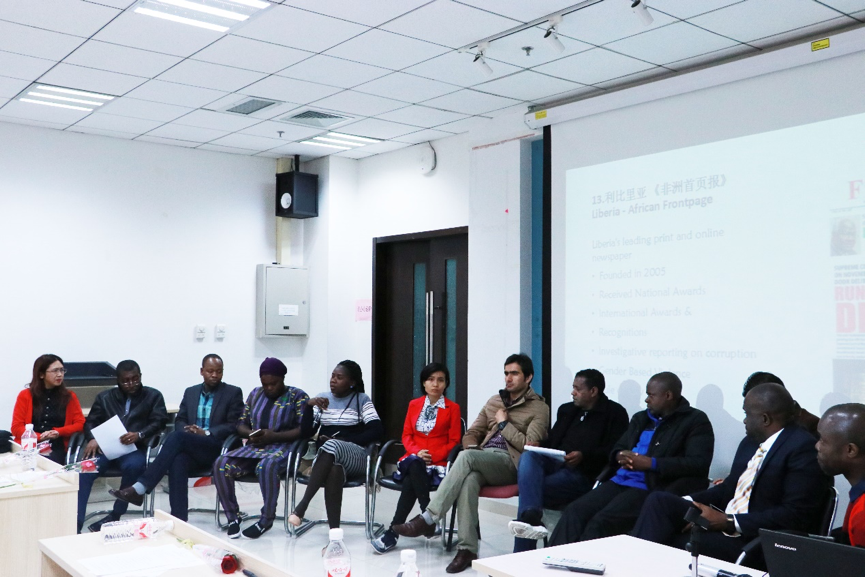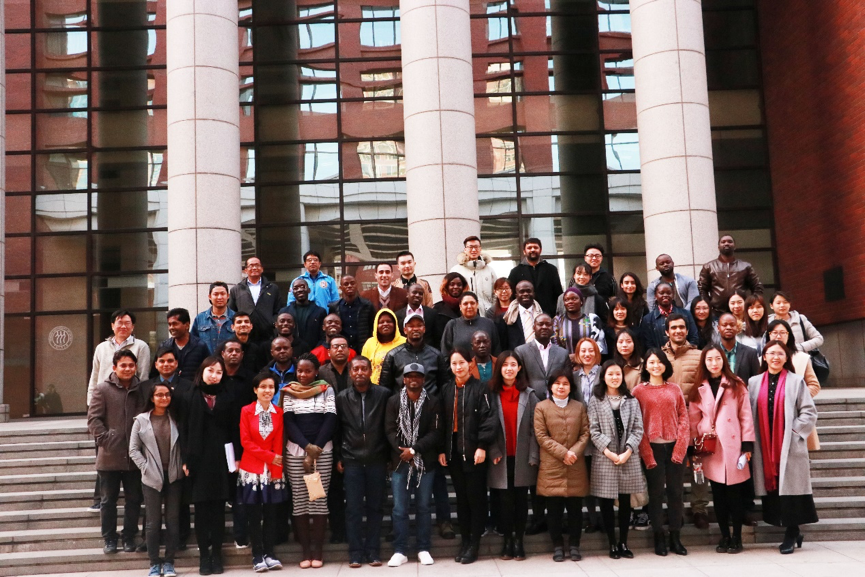The School of Journalism and Communication hosted a media salon with the topic of "Learn about Media of Countries along “the Belt and Road”: Face-to-Face with Journalists from Asia and Africa" on November 7th. Before China Journalists' Day, 26 journalists from Asian and African countries shared with each other about the basic situation of the media they worked for, and had interactions with the Chinese students.
This activity, hosted by China Africa Press Center & China-South Asia and South East Asia Press Center, was the 5th "Belt and Road" country media salon organized by the School of Journalism and Communication of Renmin University of China. 42 journalists from 39 African, South Asian and South East Asian countries, 30 students participated in this salon. The moderator was Professor Zhong Xin from the School of Journalism and Communication. The International Journalism and Communication major student Wei Xiding introduced the aim, history and main activities of China Journalists' Day to the journalists, showing the respect to journalists from the Chinese society. The salon was divided into three parts: keynote speeches, Q&A and interactions.
During the keynote speeches, journalists made the brief introductions to the media they worked for. Zaw Ye Aung from Skynet Uptodate of Burma shared the pictures taken in his on-camera interviews and his personal working experience. Ung Kaneka from TVK of Cambodia showed the videos of her anchoring and interviewing. The Mauritian journalist presented the Mauritian tourism promotional video and introduced the media he worked for.
The coverage and aim of the media are the key points of the journalists. The journalist from Al-Akhbar of Egypt said Al-Akhbar "positively took its social responsibility" in many ways, such as hosting conferences of different fields and reporting extensively the problems in economy, education and other fields, seeking solutions. Standard Times of Sierra Leone and Tanzania Standard Newsp. Ltd. of Tanzania also regarded the social justice, peace and stabilization as the important goals, showcasing the media responsibilities. The African Frontpage of Liberia and Le Pontentiel of D.R.Congo focused on major social issues such as gender, violence and human rights. Kenya Broadcasting Corporation committed itself to producing objective, beneficial and entertaining contents to the public, promoting the understanding of the policies and strategies of the government, in which way radio and television can advance the national development.
Journalists also introduced the cooperation between international media organizations and hoped to further strengthen the cooperation. Rohey Bettaye, from Gambia Radio and Television Services, said that "the reason we come to China is for cooperation." Ghanaian journalist Edmund Smith-Asante showed the audience his report on China published in the Daily Graphic. He mentioned that the cooperation with CCTV has promoted the relationship China and Ghana.
Le Soleil, a media organization in Senegal also had technical cooperation with Huawei in China. Besides, Ethiopian News Agency, Independence News Pakistan and Philippine News Agency also cooperated with Xinhua News Agency.
In the session for interaction, Professor Zhong Xin raised a question about the worldwide challenges faced by in-depth report. Journalists generally believed that the major challenges included the financial issue. Because in-depth reports, especially investigative reports, are time-consuming and laborious. The quality of journalist is another key factor because in-depth report, especially investigative report, requires a systematic approach and specialized skills. Brain drain is also a serious problem faced by media organization all over the world. Journalists need to take risks and have the courage to face danger.

A journalist was answering questions from students in the session for interaction
For the question "how to strengthen media cooperation to promote mutual understanding between the international public?", the African journalist stated that the media organizations in both China and Africa should strengthen trust and cooperation, and Chinese media needs to increase its credibility in Africa. Cooperation will help enhance mutual trust between the two countries and make the world hear the voice of developing countries. Ugandan journalist Kato said that “media represents soft power” and media played an important role in international affairs.

Professor Zhong Xin invited students to raise questions
In the end, journalists gave advices to students on future career. The Pakistani journalist said that journalists should report for the society and the people. The Liberian Journalist said that a journalist should follow his heart and bravely report events that should be reported.

All foreign journalist and students took group photo in front of the Mingde Hall.



